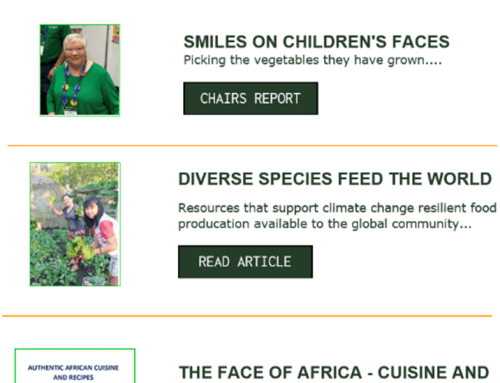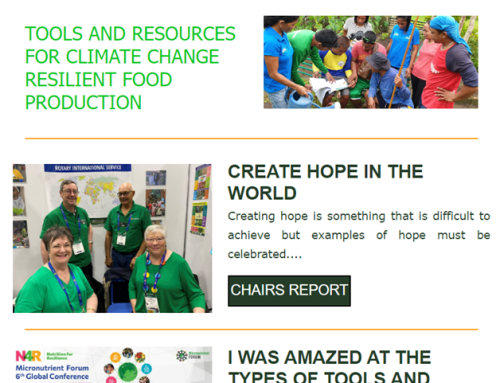Food Plant Solutions Rotary Action Group creates science-based, easy to understand, educational materials that encompass agriculture, local food plants and nutrition as one topic. This proven approach helps to provide a diverse nutritious diet using sustainable and environmentally responsible farming methods, which not only enhances food security but also helps to mitigate the effects of climate change.
Our program partners testimony speaks volumes:
“Thanks to Food Plant Solutions program to fight malnutrition, we are improving the living conditions of the entire population, teaching the population how they can improve their nutrition with a healthy diet with local plants and vegetables.”
Carlos Ferrándiz
President NGO Harapan Project, Indonesia
Invest in the future, ensure food security and care for the planet.
Contact us today info@foodplantsolutions.org
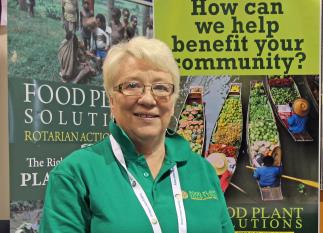
Message from the Chair
Dear Members and Friends,
Already we are nearly ½ way through this year. Another busy year for many of you.
Like you, we are concerned about the reports of the increase in malnutrition levels and the need for food relief around the world. UNICEF has said that “Nearly half of all deaths in children under 5 are attributable to undernutrition; undernutrition puts children at greater risk of dying from common infections, increases the frequency and severity of such infections, and delays recovery.”
We continue to receive increased requests for help and upon receipt of our materials receive advice of the change it has made in their community.
Some of you will be preparing to visit Melbourne for the Rotary Convention. I know it will be an exciting time, when we all learn more about Rotary programs, and meet up with friends from around the world.
We have been given an hour on Wednesday 29th May at the Convention, to present a workshop from 12 to 1 pm. We would love to see you there, as we move from “Relief to Resilience – A Solution to End Malnutrition”.
And, visit us at Booth 320 in the House of friendship, so please come and say “Hello”
Yours in Rotary,
PDG Una Hobday OAM, PHF
Chair – Food Plant Solutions Rotary Action Group
Feedback and Results from Indonesia
My name is Carlos Ferrándiz, President of the NGO Harapan Project, which helps the local population of the island of Sumbawa in Indonesia. I was a lawyer in Spain at a large law firm (PriceWaterhouseCoopers), and in 2005 I made a vacation trip to Indonesia that totally changed my life. After being in Bali for one week, I travelled to the island of Sumbawa. Upon arriving on the island, I was totally devastated by the enormous poverty that I saw in the place. Sumbawa, despite being an island much larger than Bali, barely receives few tourists, and local population lives in conditions of extreme poverty and absolute precariousness.
Profiting my stay in Sumbawa, I began to teach English. The first day about two hundred people came to my class and every day more and more people joined. At that moment I understood the enormous need they had and their desire to change their future, and that no one had ever offered them a helping hand before. At that moment the Harapan Project was born.
I decided then that I was going to change my life, quit my job as a lawyer in Spain, create a humanitarian project and dedicate my life to help the population in Sumbawa, where I have lived for 13 years now.
We carry out, among others, the following programs:
– Educational program: we teach children in local schools.
– Medical program: we help all sick children in the district.
– Organic agriculture program: We teach the local population organic and hydroponic agriculture in our agricultural school.
We have been collaborating with Priscilla Hall Memorial Foundation and Food Plant Solutions for many years now. Local population in Sumbawa suffers from severe malnutrition, due to the economic precariousness in which they live, and the lack of education on nutrition. Many pregnant women suffer from severe malnutrition and causes many babies to be born with serious malformations (cleft lip, cases of hydrocephalus, newborn children with tumors…). Thanks to Food Plant Solutions program to fight malnutrition, we are improving the living conditions of the entire population, teaching the population how they can improve their nutrition with a healthy diet with local plants and vegetables.
I believe that we are in this world to be a better person every day, and without a doubt we achieve that by helping those most in need.
Carlos Ferrándiz
President NGO Harapan Project
Instagram/Facebook @harapanproject
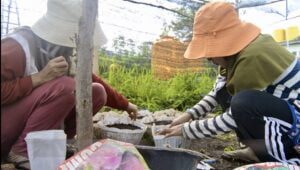

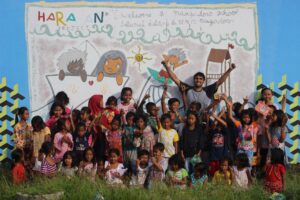
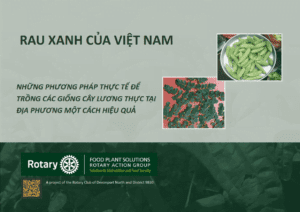
Vietnam – Free Resources
A 10 year partnership with AOG World Relief Vietnam has seen three publications created and translated into Vietnamese. These materials can be downloaded free, in print ready format at Vietnam
Please contact info@foodplantsolutions.org for more details.
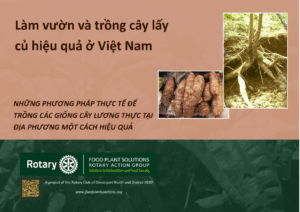
Biodiversity in Benin
The Centre de Recherche pour la Gestion de la Biodiversité (CRGB, https://www.crgbbj.org) is a non profit, nongovernmental organization. It cooperates with several African and overseas research and development institutions such as : the International Organization of la Francophonie (IOF), Agricultural Research for Development (CIRAD) ; the Pesticides Initiative Programme (PIP) of the Europe-Africa-Caribbean-Pacific Liaison Committee ; the Muséum National d’Histoire Naturelle in Paris (MNHN) in France ; the Royal Museum for Central Africa in Belgium, and others.
CRGB has completed numerous studies of an environmental nature and promotion of cultural diversity. Such as several years professional experience in biodiversity evaluation, tourism innovation, information – education – communication (IEC), estimating forest stock, mammals and invertebrate fauna research and monitoring, environmental impact assessment, training of professionals, research and innovation (epidemiology…..) and climate change adaptation.
In July 2022 CRGB signed with Food Plant Solutions Rotary Action Group for to develop the educational materials for the Benin people in Western French Africa. Please contact : info@foodplantsolutions.org
Africa’s Indigenous and Ancient Food Plants
Pretoria, South Africa – Jurie van der Walt is a former journalist and business manager who is now campaigning for the revitalisation of Africa’s ancient and indigenous food plants.
One of the most important factors when feeding communities is the nutritional value of the food available to them. This food could either have been grown in the village or on a small piece of land, or it could have been provided by an international aid organisation.
Food Plant Solutions feature on its Face Book page the following slogan: “Levels of specific nutrients in local food plants are not well understood by local people, agriculturists or many aid providers”. This is an astonishingly true fact. Throughout the developing world, indigenous food plants which have nourished millions of people over thousands of years are today neglected and regarded as inferior.
Today we know that the African continent provides around 2,000 native grains, roots, fruits, and other food plants. African indigenous crops possess several advantages and potentials that have not been fully exploited. Research have pointed out that the following characteristics contribute to the need to revive Africa’s indigenous crops:
- Their NUTRITIVE VALUE: They contain high levels of minerals especially calcium, Iron and Phosphorus. They also contain significant amounts of vitamins and proteins. In most cases the mineral and vitamin contents are equivalent to or higher than that found in popular exotic crops.
- Their MEDICINAL VALUE: The list of indigenous crops with medicinal value is substantial.
- AGRONOMIC ADVANTAGES: Indigenous crops are well adapted to harsh climatic conditions and disease infestation and are easier to grow in comparison to their exotic counterparts. In addition, they have a short growth period with most of them being vegetables ready for harvesting within 3-4 weeks. They also respond very well to organic fertilizers.
What needs to be done? It is time for governments, international aid originations and international food agencies to actively start promoting the reintroduction of these ancient food plants into the diets of communities they serve. A concerted effort must be made to collect and multiply the seeds of a selected number of indigenous food plants, and to enable communities to grow and consume these food plants regularly.
Donate with Confidence
Food Plant Solutions was delighted to recently achieve ACNC registration.



